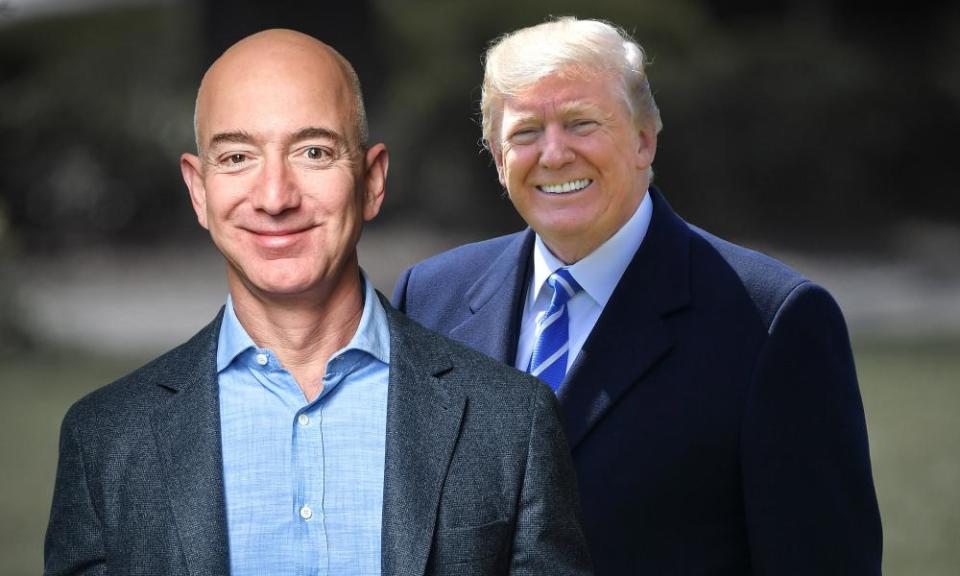Trump's enemy is not your friend: why we shouldn't defend Amazon
Why must we choose between the worst president of our lifetimes and one of the most rapacious corporate enterprises in the country?

President Trump last week resumed his campaign of critical tweets about the online retailer Amazon, which he accuses of paying too little in taxes and of getting too good a deal from the United States Postal Service, which delivers many of its packages. Along the way he also asserted that the company used the Washington Post, which is owned by Amazon’s chief executive, Jeff Bezos, to lobby for Amazon’s interests. The price of Amazon shares fell on the news.
In threatening a single business because of some personal quarrel with its CEO – apparently in order to squeeze friendlier coverage out of a newspaper that the CEO happens to own – Donald Trump has clearly violated the basic rules of democratic government. But it is also important to remember that the enemy of my enemy is not necessarily my friend. Amazon has been the subject of critical reporting for a number of years; anyone who reads the Guardian or the New York Times knows about the company’s alarming labour practices and its imperial economic ambitions.
Yet some critics of the president took his tweets as a signal to rally round Amazon and its chief executive. They joked about how jealous Trump must be of Bezos’s billions. They fantasised about how Bezos might contrive to humiliate the president by buying still more media properties. They clucked over Trump’s stupidity on the matter of the postal service. They snickered at his inability to understand modern internet enterprises.
Given the chance to remind the public of American liberalism’s instinctive tendency to defend cyber-oligarchs like Bezos against the claims of those it sees as uncomprehending luddites, Team Liberal jumped at it.
Along the way, they gave us a vivid reminder of why modern liberalism keeps generating – and losing to – unbelievably awful antagonists such as Trump. Put it this way: yes, Trump hates Amazon, and its chief executive, and his newspaper the Washington Post. But Trump’s blustering animosity doesn’t make Amazon an admirable company. Nor does it make the Washington Post a temple of objectivity, untainted by the capital’s culture of influence-peddling.
Confronting autocratic economic power is what Democrats used to do. Now Trump is trying to swipe that legacy
Take the matter of the postal service’s contract with Amazon – the cause of so much self-assured guffawing among the know-better set. Guess what? The president’s complaint here is kind of legit. While it might be technically correct that the US postal service makes a “profit” on its current arrangement with Amazon, it would also be correct to say that it could easily be making a lot more.
If you care about the postal service workforce, maybe you too might want to show some concern about the question rather than brush it off as yet more idiocy from the comb-over caudillo.
Or take the larger question of Amazon’s overwhelming and unaccountable market power, which journalists and scholars have documented painstakingly and at great length – and yet which many commentators seem to have forgotten the instant Trump started bad-mouthing Bezos. “Amazon is the shining representative of a new golden age of monopoly,” is how the Atlantic journalist Franklin Foer put it in 2014, and what he said then is even truer today.
Confronting concentrated, autocratic economic power is what Democrats used to do. It was the definition of the species. They fought against monopolies in oil and food and transport that ripped off producers with one hand and consumers with the other. But now it’s Trump who, in his clumsy and authoritarian way, is trying to swipe that legacy.
I am making a tricky point here, so let me be clear: I don’t like Amazon, and I don’t like Donald Trump either. I would approve enthusiastically if a president started enforcing antitrust laws, but that’s not what Trump is proposing to do. What we are being offered instead is a choice between the worst president of our lifetimes and one of the most rapacious corporate enterprises in the country. And, eagerly, we are lining up with one or the other.
This in turn seems to me an almost perfect representation of the wretched choices available to Americans these days, as well as the megadoses of self-deception we are swallowing in order to make them. It is everything that is wrong with our politics, and it extends from the most sweeping matters of state right down to the individual reader.
It set off my alarm bells when the would-be monopolist Bezos tangled with the book publisher Hachette in 2014, just after buying the most important news outlet in Washington – but after reading Trump’s bullying tweets on Amazon, I want to like the plucky plutocrat from Seattle.
Similarly, I despise what this president is doing to the US – but after watching CNN or reading the Washington Post’s op-ed page I sometimes want to like Trump too. That’s how their transparently unfair coverage affects me.
And this is where we are now in the world’s greatest democracy. We have the billionaire Republicans, with their bigotry and their war on all things public, and the billionaire Democrats, with their oblivious ideology of globe and technology. To the common people, assembled in all our majesty, the momentous question is posed: who do you hate more?
• Thomas Frank is an American political analyst and historian, and author of Listen, Liberal: or, What Ever Happened to the Party of the People?

